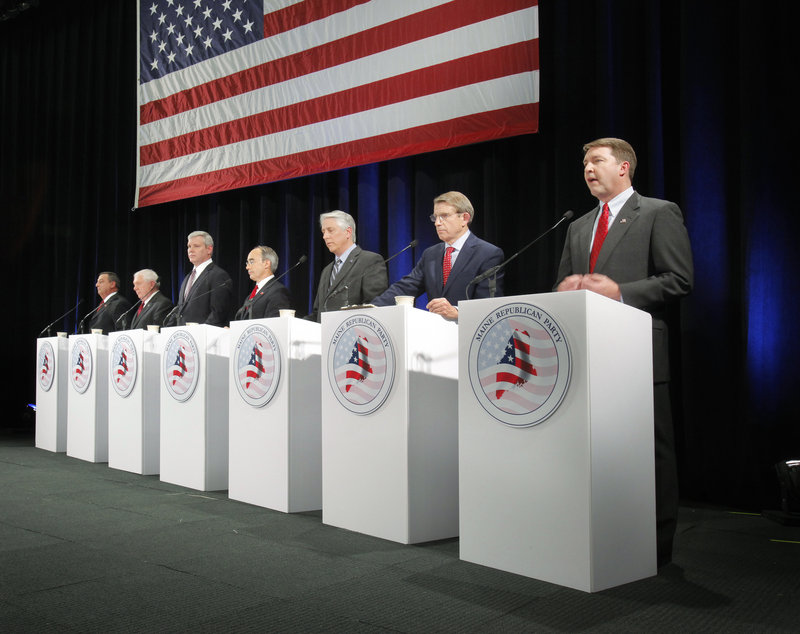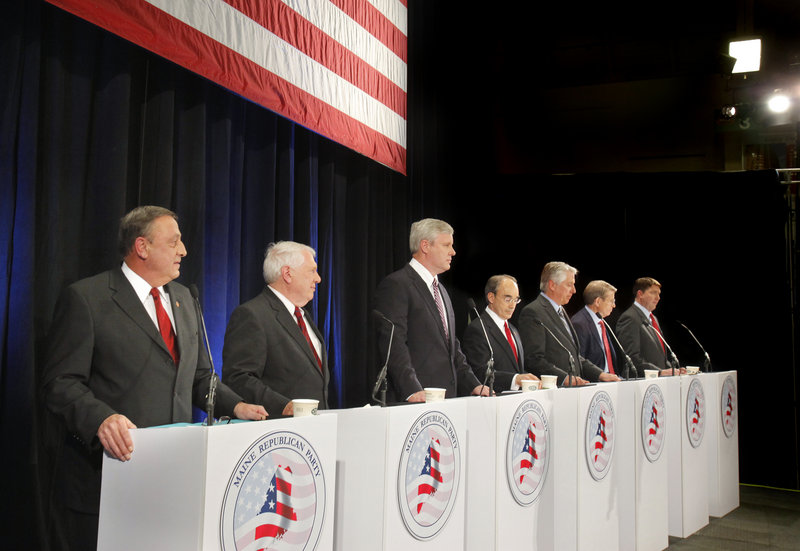PORTLAND – Maine’s seven Republican candidates for governor sparred Friday evening over whether the state missed a chance to keep The Jackson Laboratory from expanding in Florida, if it’s a wise investment to buy a failing rail line in Aroostook County, and what it takes to be an effective leader in tough economic times.
In the second of two Great Debates, hosted by MaineToday Media and WGME-TV, the candidates made their appeals before an estimated 2,200 party loyalists who gathered at the Portland Expo to kick off the Republican State Convention.
With the primary a month away, the candidates are hoping to distinguish themselves in a crowded field. Four Democrats are vying for their party’s nomination. One independent has qualified for the November ballot.
Friday’s debate featured Steve Abbott, former chief of staff for U.S. Sen. Susan Collins; Bill Beardsley, a former president of Husson College; Matt Jacobson, chief executive officer of Maine & Co.; Paul LePage, Waterville’s mayor and the general manager of Marden’s; Sen. Peter Mills, a longtime state lawmaker; Les Otten, a longtime businessman from Greenwood; and Bruce Poliquin, a businessman and developer from Georgetown.
The candidates were asked about Jackson Lab, the biomedical research company in Bar Harbor that employs 1,200 people in Maine.
The issue of its expansion has become a lightning rod in this campaign. Jackson Lab is being courted with $260 million in state and county money to expand to a new research campus in Florida, where it could create 200 new jobs.
Jackson Lab has said that the money being offered by Florida, and the presence of top biomedical research facilities, led it to consider the expansion south. It also said it plans to create at least 200 new jobs in Bar Harbor over the next five to 10 years, regardless of what happens in Florida.
Some candidates, notably Otten and Democrat Rosa Scarcelli, have made it an issue in their campaigns.
As he had in past forums, Otten contended Friday that the state didn’t fight hard enough to entice Jackson Lab to expand here, and he repeated the assertion that the new facility in Florida would create thousands of jobs. Jackson Lab officials have said that those lofty job projections are associated with a wider biomedical zone that would include many other employers.
But on Friday, Otten said that if the Jackson Lab deal remains unsigned when he’s elected governor, he’ll go to Bar Harbor immediately. “I think we missed a huge opportunity,” he said.
LePage said the case is another example of the state failing to be proactive.
“Wealth goes where it’s welcome and stays where it’s appreciated,” he said.
But most of the other candidates took the view that Maine can’t compete directly with what Florida has to offer.
Beardsley said that instead of pursuing a “field of dreams” strategy, Maine must understand exactly what businesses need and want to expand here. For instance: Jackson Lab has said it needs more nearby, affordable housing for its workers.
Abbott said Maine can’t compete with the money Florida is offering. But it didn’t help matters, he said, when Maine alienated Jackson Lab eight years ago by imposing a fine for a minor environmental infraction.
“That’s what’s driving businesses out of Maine,” he said.
Jacobson, who recruits businesses for a living, said Maine lacks the educational and training programs that Jackson Lab and other biomedical firms need.
The candidates also drew distinctions over what role, if any, the state should play in saving the only rail line in Aroostook County.
Jacobson, a former president of the St. Lawrence & Atlantic Railroad in Auburn, differed with some of the candidates over the future of the Montreal, Maine & Atlantic Railroad, which is seeking to abandon 233 miles of track in northern Maine.
The state has proposed spending $7 million to save the line, as part of a larger bond package. That’s a mistake, Jacobson said. The state invested money in the rail line three times previously, with poor results.
Otten agreed, saying that trucks could handle the freight, and that the state shouldn’t be propping up a failing railroad.
But Abbott said that the line is critical for 22 employers in northern Maine, and that southern Maine residents should realize how important the railroad is there.
Mills, who as a legislator negotiated some of the conditions of the bond, said the state had reduced its risk by putting up no more money than the line’s salvage cost.
Poliquin voiced an opinion that he expressed throughout the debate: Maine is broke and shouldn’t take on more debt.
With the state struggling to emerge from the recession and facing a $1 billion budget shortfall, it was no surprise that each candidate portrayed himself as being uniquely able to create jobs and lower taxes.
LePage pointed to his record as a Republican mayor with a city council dominated by Democrats; Beardsley talked about how he expanded Husson University; Poliquin highlighted his abilities as a business manager of a large company.
In his closing remarks, Abbott noted that Republicans have won only two of the last 11 gubernatorial races in Maine, and said the party needs to take on the special interests that keep Democrats in power.
Staff Writer Tux Turkel can be contacted at 791-6462 or at:
tturkel@pressherald.com
Send questions/comments to the editors.




